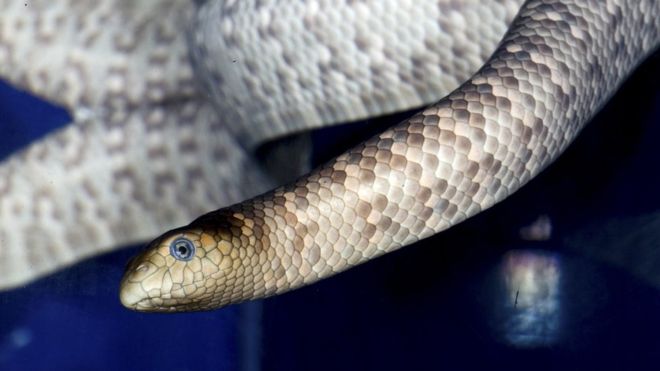British man dies from sea snake bite in Australia
The 23-year-old backpacker was reportedly bitten when pulling up net on fishing boat

A free daily email with the biggest news stories of the day – and the best features from TheWeek.com
You are now subscribed
Your newsletter sign-up was successful
A British man has died after being bitten by a sea snake on a fishing trawler in Australia.
Australian police said the 23-year-old, thought to be a backpacker, had just pulled up a net off the coast of the Northern Territory when he was bitten.
Emergency crews were called to the boat, near the island of Groote Eylandt, but were unable to save the man.
The Week
Escape your echo chamber. Get the facts behind the news, plus analysis from multiple perspectives.

Sign up for The Week's Free Newsletters
From our morning news briefing to a weekly Good News Newsletter, get the best of The Week delivered directly to your inbox.
From our morning news briefing to a weekly Good News Newsletter, get the best of The Week delivered directly to your inbox.
At least 32 species of sea snakes have been found in warmer waters off the Northern Territory and Queensland, according to the Marine Education Society of Australasia (MESA).
They “are venomous but considered to be non-aggressive and rarely attack unless provoked”, says The Guardian.
MESA said most sea snake bites occur on trawlers, although only a small proportion are fatal to humans as it is rare for much venom to be injected.
The society added that most bites reportedly occur on fishing trawlers, as workers pull in nets, as was the case in this case.
A free daily email with the biggest news stories of the day – and the best features from TheWeek.com
It is thought the case may be the first recorded death from a sea snake in Australia.
Professor Bryan Fry, from University of Queensland, described it as a “tragically unlucky accident”.
“By and large they are very gentle animals, and people do go scuba diving with them all the time,” he told the BBC.
“But in a fishing trawler situation, where they've been potentially dragged through the water in a net, they will come up injured and perhaps looking to lash out.”
A British High Commission spokesperson said: “We are supporting the family of a British man who has died in the Northern Territory and are in contact with the Australian authorities.”
According to research published last year, snakes were responsible for 27 deaths in Australia between 2000 and 2013.
-
 ‘Restaurateurs have become millionaires’
‘Restaurateurs have become millionaires’Instant Opinion Opinion, comment and editorials of the day
-
 Earth is rapidly approaching a ‘hothouse’ trajectory of warming
Earth is rapidly approaching a ‘hothouse’ trajectory of warmingThe explainer It may become impossible to fix
-
 Health insurance: Premiums soar as ACA subsidies end
Health insurance: Premiums soar as ACA subsidies endFeature 1.4 million people have dropped coverage
-
 Epstein files topple law CEO, roil UK government
Epstein files topple law CEO, roil UK governmentSpeed Read Peter Mandelson, Britain’s former ambassador to the US, is caught up in the scandal
-
 Iran and US prepare to meet after skirmishes
Iran and US prepare to meet after skirmishesSpeed Read The incident comes amid heightened tensions in the Middle East
-
 Israel retrieves final hostage’s body from Gaza
Israel retrieves final hostage’s body from GazaSpeed Read The 24-year-old police officer was killed during the initial Hamas attack
-
 China’s Xi targets top general in growing purge
China’s Xi targets top general in growing purgeSpeed Read Zhang Youxia is being investigated over ‘grave violations’ of the law
-
 Panama and Canada are negotiating over a crucial copper mine
Panama and Canada are negotiating over a crucial copper mineIn the Spotlight Panama is set to make a final decision on the mine this summer
-
 Why Greenland’s natural resources are nearly impossible to mine
Why Greenland’s natural resources are nearly impossible to mineThe Explainer The country’s natural landscape makes the task extremely difficult
-
 Iran cuts internet as protests escalate
Iran cuts internet as protests escalateSpeed Reada Government buildings across the country have been set on fire
-
 US nabs ‘shadow’ tanker claimed by Russia
US nabs ‘shadow’ tanker claimed by RussiaSpeed Read The ship was one of two vessels seized by the US military